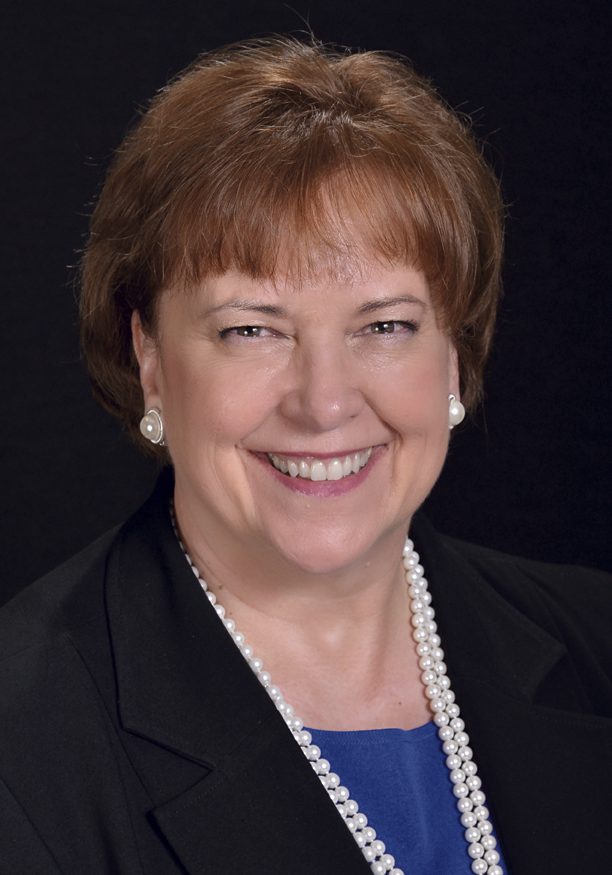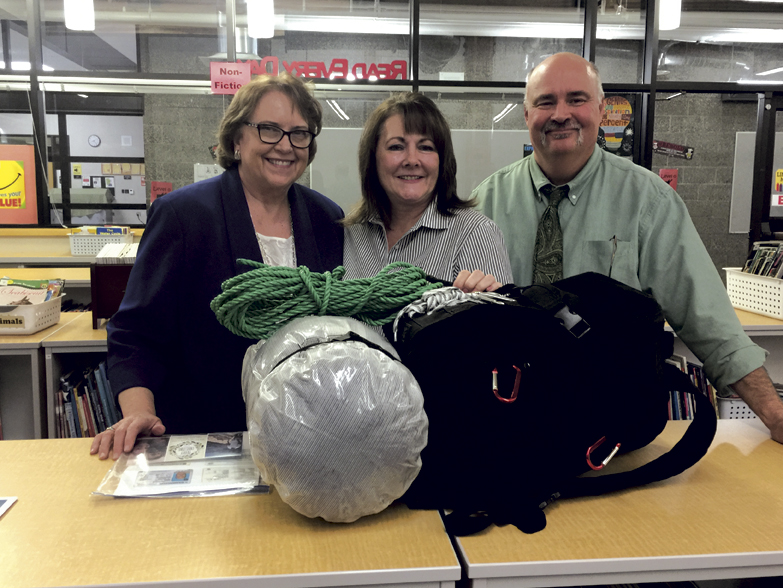PERSONAL LINES FOCUS
CARING FOR “COMRADES” AND CLIENTS
Successful personal lines marketing recognizes the importance of team members and customers
By Dave Willis, CPIA
Personal lines marketing involves many approaches. But two agencies—past Rough Notes cover honorees—accentuate the “personal” in how they market. Their tactics formed the foundation for a session they led at this year’s Hawksoft Users Group meeting in Las Vegas. Two key elements, they believe, are caring for comrades and caring for clients.
Patty Lares, principal of AA Lares Insurance, started her agency from scratch in 2000. The multi-site operation, headquartered in Orange, California, was the April 2017 Rough Notes Agency of the Month. Claudia McClain is principal of Everett, Washington-based McClain Insurance Services. The personal-lines-only agency has been around for 42 years and was the Rough Notes 2014 Agency of the Year.

—Patty Lares
Principal
AA Lares Insurance
Employees first
Lares speaks to the role of caring for employees—or as she calls them, comrades—in growing an agency. “We often hear ‘comrade’ used in reference to soldiers,” she explains. “That’s interesting, because soldiers’ lives depend on each other; they’re trained to do a job, they have to do it well, and if they don’t, they could lose their life. Also, soldiers won’t leave a wounded comrade behind.”
She looks for similar interaction among agency team members. “Caring for comrades starts at the top, with how I communicate to staff that I care,” Lares notes. “When I started dating my husband, he’d write me little notes, providing positive and constant reminders he cared for me. I knew he was my comrade—that he’d have my back and would take care of me.
“Now, we don’t date team members, but the attitude is the same: We need to let them know how much we care about and appreciate them,” she explains. One way they do this is through their “Shining Stars” program. It started with a box; people would secretly put uplifting and complimentary notes about fellow team members inside for sharing later. Now, they post these positive messages on a board for everyone to see.
“We start with a clean board each month,” Lares explains, “and by month-end, the board is filled with notes. At our monthly meeting, the person receiving the most compliments gets a small trophy recognizing them as our Shining Star of the Month.”
Another activity involves new employees. “As we onboard a team member, we send them a welcome package—a decorated box with welcoming messages from everyone on the team,” she says. “Along with the box is a balloon that says, ‘Welcome Home,’ and a book, w. On their first day of work, we provide ‘Welcome Home’ balloons at their desk, a mug, and a Starbucks gift card. They’re going to need some coffee because they’ll be busy and learning a ton.”
The agency also celebrates birthdays—buying the cake and other food. Team members can bring small gifts if they want. “Anniversaries also are huge,” Lares says. “That’s something I, as a leader in my agency, do personally. We always have a balloon with the number of years they’ve been on board, but I try to include something special, like tickets to a concert, or something else they may have mentioned to me.”
In addition, the agency does a takeoff on credit card or frequent buyer reward programs. “We created a point system in our office and employees earn points for activities they do,” she explains. “A chart lists points earned for things like cross-selling and getting a written testimonial, a video testimonial, a referral and more. Basically, they’re different marketing-related activities. Points earned count as entries for a raffle we do each quarter and toward a year-end $1,000 grand prize.
 “Monthly meetings are fun,” Lares adds, “because we reward team members when we meet goals we’ve set as an agency.”
“Monthly meetings are fun,” Lares adds, “because we reward team members when we meet goals we’ve set as an agency.”
But they also focus on individuals and their goals. “We don’t want to forget what’s happening in team members’ lives and how we can support them,” she notes. “We have a program called PX3, which stands for passion, purpose and profit. Every month, I sit down with each employee and we talk about goals, both business and personal. I find it valuable to sit down and listen to what they have to say about their dreams and how we can help them realize them.”
To drive continual employee learning, the agency encourages reading—and recently implemented a book club. “In addition to taking classes to expand knowledge, people learn by reading,” Lares observes. “Now some people don’t like to read. That’s okay. They can listen to audiobooks!” Employees buy or download a book, read it, and then the agency reimburses them. The book club meets once a month and team members choose the book they want to share. “They’re not all business books, and I think that’s why it works,” she adds.
Client focus
According to McClain, much of caring for clients is built around an agency welcome sequence. “It’s really important to get clients on board and have them get to know your agency in a systematic way,” she explains. “We’ve created a road map that drives introduction. It’s basically a combination of old-school techniques—picking up the phone, talking to people, thanking them, and sending a gift—and newer ones—things like texting and emails.
“We used to send out one welcome piece containing everything a client should know,” she notes. “But clients found it hard to digest all that information at once. So now, we drip information in the first few months they’re with our agency.” As part of the sequence, the agency tries to send something a client wouldn’t expect to get from an insurance agent.
“Right now, that’s a water sensor that’s available for $9 or so on Amazon,” McClain says. “We send it with a note welcoming them to our community that talks about protection and relationship.”

—Claudia McClain
Principal
McClain Insurance Services
Later in the welcome sequence, the agency describes its referral rewards program. “People think clients who’ve been around for 30 years give the most referrals, but from our experience the very best time to get referrals is when clients are new,” she explains. “When someone is served better than they’ve ever been served before, they tell others.”
When someone does make a referral, the agency sends them a $2 bill along with a thank-you note. “And we ask them to use the $2 bill to make somebody else’s day—give it as an extra tip or something,” McClain explains. “We also let them know we’re giving $25 to our charity of the quarter.”
Another way the agency cares for clients is to make them safer. “That has a double benefit: It helps them, but it also helps your loss ratio, which probably makes you richer,” she says.
The agency offers defensive driving classes at a local community center. “We pay the instructor her fee for any of our clients who attend the class, but she’s free to have others take part,” McClain explains. “Her bill shows who took the class; we add the defensive driving discount to their policy, so they save twice: They haven’t had to pay for the class, and they save money on their insurance.” Different states have different rebate laws; Washington’s includes a $100 threshold and the defensive driving classes are less than that. The agency also offers access to an online defensive driving course for seniors.
The agency also promotes safety through a preparedness focus. “We’re in the protection business; our clients might have a fire or earthquake or wildfire, and they need to know how to be prepared,” McClain explains. “Our administrative assistant and her husband are passionate about preparedness. One thing they do is prepare ‘go-bags’—emergency-preparedness bags that people pack in advance but hope they never need.” They pack nonperishable food and potable water that can last several days, as well as tools, like a flashlight and a Swiss Army knife, and extra clothing and blankets.
The couple teaches others how to put together a go-bag; the agency shared the info about the bags in its newsletter and on its website. A local blogger picked it up and then a neighborhood group found out about it and word spread. “It fits nicely with what we do,” McClain says. “The point is, if someone on your team has a special talent or passion—it may not be preparedness; it could be something else—communicate that to your clients and build an event around it.”
McClain suggests listening to the news—or to customers—for other ways to care for clients. “We have a long-time client who had a very elegant house, only about nine years old,” she explains. “A pipe broke in the house. Now he’s a smart guy, but he had forgotten where the main water shutoff valve was.” The loss was substantial.
“We came up with an idea based on that event and it’s this: We went out and bought bright yellow luggage tags that can be personalized, and we had ‘WATER SHUTOFF’ printed on them,” she notes. “We distribute them, and people tag the shutoff valve. All of a sudden, a fluorescent luggage tag becomes a loss prevention tool.”
 Governmental actions can also lead to ways agencies can care for clients. “Our state has one of the most restrictive cell phone laws—you can’t even be holding your cell phone at a stoplight or when pulled to the side of the road,” McClain explains. “We got imprinted dashboard cell phone holders and sent an email blast announcing they were available. People could stop by and pick them up or we’d mail them.
Governmental actions can also lead to ways agencies can care for clients. “Our state has one of the most restrictive cell phone laws—you can’t even be holding your cell phone at a stoplight or when pulled to the side of the road,” McClain explains. “We got imprinted dashboard cell phone holders and sent an email blast announcing they were available. People could stop by and pick them up or we’d mail them.
“We’re also in an environmentally aware region and an outgrowth of that has been a ban in Seattle on plastic straws and utensils in bars and restaurants,” she says. “Our response: a reusable straw in a McClain Insurance-branded pouch—complete with a straw cleaner.
“We also have regular communication with clients—up to 24 touches each year—via email, handwritten notes, newsletters, video, and more,” McClain notes. “At Thanksgiving, we sent a card signed by every team member that also included seasonal conversation starters to get people thinking and talking about what they’re thankful for.”
Interestingly, the agency doesn’t send Christmas greetings. “Christmastime is for families, and there’s enough busyness and clutter at that time already,” she notes. “However, for a couple of days leading up to Christmas, we offer surplus McClain imprinted items as stocking stuffers. People can come in to pick them up and enjoy some cookies and hot apple cider.”
Don’t reinvent
Quality guru W. Edwards Deming was a proponent of people using others’ ideas and experience to improve their own operations. Among the more popular phrases he shared with protégés was “Steal shamelessly.”
Lares and McClain endorse the approach, as evidenced by their own willingness to share. Individuals replicating or building on what these award-winning agencies have done wouldn’t necessarily be the first to do so. “Many of these ideas have been borrowed from other agencies and tweaked,” McClain notes, all for the betterment of the independent insurance agency system.






